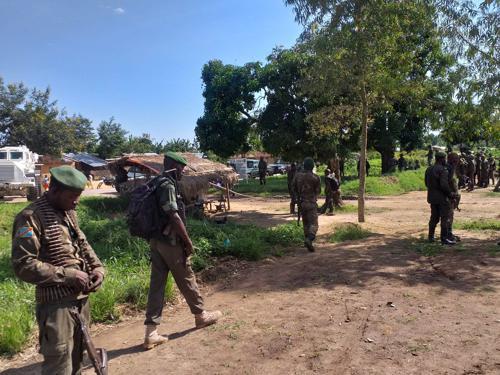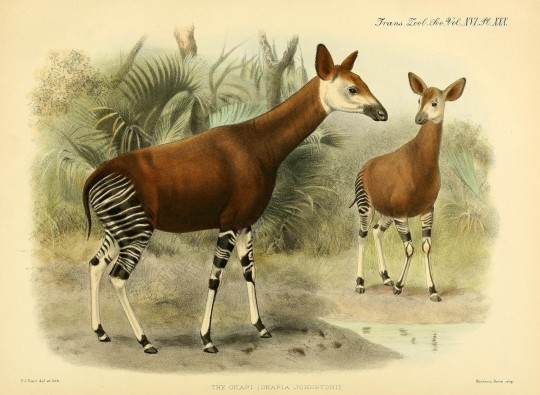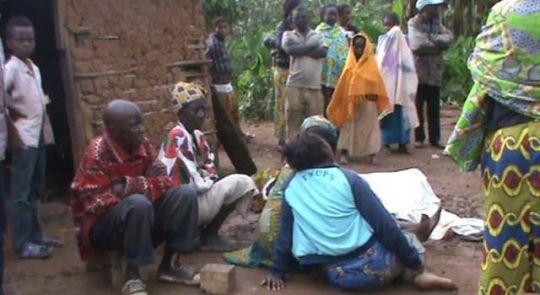#ituri
Text
Des hommes ou de leurs faits ?
Ci-dessous, repris tel que reçu, un texte qui nous parvient de l’Ituri et qui montre que le torchon brûle, dans mon terroir…
Si l’Ituri ne se décide pas de se désencombrer, notre condition s’empira, nous mourrons encore et toujours, sous l’inutile état d’urgence. Que manque-t-il à l’Ituri aujourd’hui pour son indépendance politique, économique, culturelle, administrative, industrielle et autre…
View On WordPress
8 notes
·
View notes
Text
Ituri PDL145T : Réception technique de l’école primaire DUABO (Territoire : Irumu)
Le Bureau Central de Coordination (BCECO) a réceptionné techniquement en date du 26 juin 2023, l’école primaire DUABO, dans la Province d’ITURI, territoire d’Irumu, au village Mbriti.
Les travaux sont exécutés dans le cadre du Programme de Développement Local des 145 Territoires du président de la République et Chef de l’Etat, Félix Antoine Tshisekedi.
Cette école est constituée de six salles…

View On WordPress
0 notes
Text
#PoliticoCD. | Ituri : Deux morts dont un militaire et deux blessés dans un échange des tirs avec un déplacé armé au site de Rhoo
#PoliticoCD. | Ituri : Deux morts dont un militaire et deux blessés dans un échange des tirs avec un déplacé armé au site de Rhoo
Au moins deux personnes sont mortes dont un militaire FARDC, deux blessés et une arme récupérée, c’est le bilan d’un échange des tirs, ce samedi 29 octobre 2022, entre des éléments des forces armées et un présumé déplacé bien armé au site de Rhoo en territoire de Djugu (Ituri).
D’après Jules Ngongo, porte-parole des opérations militaires en Ituri, qui livre la nouvelle à POLITICO.CD, une femme…

View On WordPress
#armé#avec#blessés#dans#déplacé#Des#deux#dont#échangé#Ituri#militaire#morts#PoliticoCD#Rhoo#site#tirs
0 notes
Text
RDC : Pas d'installation de nouvelles Assemblées provinciales du Nord-Kivu et de l'Ituri avant la levée de l'état de siège (Officiel)
Les nouveaux députés provinciaux élus des provinces du Nord-Kivu et de l’Ituri devraient attendre. Attendre peut-être même pour très longtemps. Car, l’état de siège est toujours en vigueur dans leurs entités et l’insécurité continue de battre son plein dans plusieurs localités.
Le ministre congolais de l’Intérieur qui a été saisi par le gouverneur militaire du Nord-Kivu pour y voir clair a…

View On WordPress
#l&039;Ituri avant la levée de l&039;état de siège (Officiel)#Les nouveaux députés provinciaux élus des provinces#Nord-Kivu et de l&039;Ituri devraient attendre#Pas d&039;installation de nouvelles Assemblées provinciales du Nord-Kivu#RDC
0 notes
Text
(this article was published oct. 30, 2023.)
Geneva/Kinshasa – The International Organization for Migration (IOM) is intensifying its efforts to address the complex and persistent crisis in the Democratic Republic of the Congo (DRC) as the number of internally displaced people climbs to 6.9 million people across the country – the highest number recorded yet. For the first time, nationwide displacement data has been collected in all 26 provinces of the country by the United Nations through IOM’s Displacement Tracking Matrix.
As of October 2023, most internally displaced persons, about 5.6 million (81 per cent of the total IDPs) live in the eastern provinces of North Kivu, South Kivu, Ituri, and Tanganyika. Conflict has been reported as the primary reason for displacement. In the eastern province of North Kivu alone, up to 1 million people have been displaced due the ongoing conflict with the rebel group “Mouvement du 23 Mars” (M23). More than two-thirds of the internally displaced persons, nearly 4.8 million people, live in host families.
379 notes
·
View notes
Photo

Efe forager, 1978. From "A walk through a rain forest: life in the Ituri Forest of Zaire" by David Jenike. https://www.instagram.com/p/CledaDpNtCi/?igshid=NGJjMDIxMWI=
74 notes
·
View notes
Photo

Barkcloth ‘Pongo’ from the Mbuti people of the Ituri Forest of DR Congo, 20th century, Beaten bark from ficus tree, stamped and drawn with natural pigment.
38 notes
·
View notes
Text
[Fluff] Toshinori Yagi And Female! Child Reader *Father Knows Best* Part One

Toshinori didn’t ask for the wound on his stomach nor did he want his life to end if he used up his power to battle villains that were causing harm to citizens, however, he did ask or wished for a family to have a happy life. Even though he has Izuku to be his successor and acts as a father figure to the young boy, his wish came true when he scrambled across an orphanage with children and teens running around and playing games; making him small softly to watch happy children and teens playing with each other.
That’s where he met [Name], a young girl with [Hair Length] [Hair Color] with [Eye Color] eyes. Toshinori could feel his heartbeat against his chest as if he felt a connection with the young child, hesitating to take a first step on the stairs that lead to the Orphanage’s doors; maybe he shouldn’t get involved with adopting a child but his heart is telling him otherwise. The older male soon found the courage to walk up the stairs of a small hill, heading towards the doors to enter the said building to know about the little girl.
Once Toshinori had entered the building to see if he could find any information about the little girl that he had seen, the walls were decorated with drawings from the children and probably teens as well. “May I help you, sir?” A young caretaker was standing behind the counter where the computer and keyboard were resting along with a book, probably the adoption book where the adopted parents sign in or something like that. “Well yes, I was wondering about a child.” He made his way over to the counter.
The female behind the counter lifted an eyebrow while being in alert mode all of a sudden, although calming herself down. “Are you adopting this child that you’re interested in?” She asked as Toshinori came to the stop at the counter, placing both hands on the counter. “Yes, I am.” He knew the risk but the child that he had seen would put him in danger, but he couldn’t help but feel like a father would make him alive.
Hearing the typing of the keyboard made the older male with blonde hair patient with the older female behind the counter, only hearing the typing stopped. “Which child are you interested in adopting?” The female asked, waiting for his response. “A young child with [Hair Length] [Hair Color] with [Eye Color] eyes.” Toshinori can only describe the child’s appearance to the lady behind the counter.
“[Name] [Last Name]?” The female asked while pulling up the child’s photo and turning the motor towards the older male, who nodded his head since he expected to notice the other children. “Yes, that’s her.” He couldn’t believe this child would be his adopted child, although he would spend most of his time with her to grow a bond and have someone to babysit her while he was at school as his job.
A young teenager with her hair pulled up into a bun came inside with a clipboard in her arms, making Toshinori guess that she was an intern or a caretaker that’s working there to take care of the children. “Ah there you are Ituri, could you do me a favor and get [Name] and help her pack her things? This gentleman is adopting her.” The older female behind the counter asked the teenager. “Of course Katherine.” Ituri does what she has been told.
Katherine soon returns her attention to Toshinori while pushing the book toward him with a pen attached to the said book. “I need you to sign a paper and you’ll be all set to take your child home.” She opens the book to non-sign pages, which some parents have to sign a paper and such. Toshinori did what he had been told which made him wonder what he should do for his newfound child’s room, maybe he could ask for help from a friend to help him out.
Once he finished signing the paper while Ituri arrived back with [Name] and her book bag on her back, which only had a few clothes and toys for her to wear and play with. “Well [Name], you have a new father. Be a good girl now, okay?” The teenager kneels to the younger child and booping her nose softly, earning a smile from the young child. “Okay, Aunt Turi.” [Name] smiled at the teenager, hugging her softly.
[Name] had grown attached to Ituri during her days, months, and years with the teenager, having her teaching her about how quirks work and how some of them are animal-based or mythical creature-based ones. “Well Mr. Yagi, congratulations on becoming a parent to a wonderful child.” Katherine watched as Ituri helped [Name] approach her newfound father that adopted her.
Toshinori decided to kneel to her level and hold his hand for a handshake from the child in front of him, although he should be careful not to startle her if she has a quirk or not. “It’s nice to meet you, I’m Toshinori Yagi, but you can call me whatever you like.” He smiled at her to let her know that he wasn’t going to hurt her, watching her movements as she took his hand and gave him a small handshake. “I’m [Name] [Last Name], nice to meet you.” She was relaxed around him.
It made his heart sink to know that she was well-mannered, although he couldn’t help but smile still. “Are you ready to go to your new home?” Toshinori soon places a free hand on top of her head, rubbing it softly since he couldn’t believe that he had adopted a child without telling anyone, or his friend for that matter. “Yes, I’m ready to go.” [Name] nods her head softly in agreement to go to her new home, excited to be adopted by someone who wanted her and to raise her.
Both Ituri and Katherine waved goodbye to Toshinori and [Name] which made them happy and sad at the same time since everyone in the orphanage was like family, but they were glad that the [Hair Color] haired girl had found someone to call a father. Toshinori holds [Name]’s hand as they walk down the street, stopping in his tracks when he hears a small stomach grumbling. “Are you hungry?” He asked his new daughter, watching her nod her head softly.
Toshinori started to think of a place where they should eat since he was a bit hungry as well, looking around to find a nearby restaurant for them to eat. Soon he noticed a small place for them to eat, holding her head softly before heading towards the said place, leading [Name] to the said restaurant, hoping they were still open for lunchtime. “They’re still open for the rest of the day, would you like to eat here?” He asked his daughter while getting a nod from her.
#Boku No Hero Academia X Reader Inserts#My Hero Academia X Reaider Insert#Toshinori Yagi X Reader#Child Reader#Adoptive Father Toshinori#Fluff Insert
32 notes
·
View notes
Photo

Happy Mammal Monday!
Okapi (Okapia johnstoni) are native to the Ituri Rainforest in northwest Democratic Republic of the Congo in central Africa. Though they resemble both zebras and giraffes, they are more closely related to giraffes.
SciArt by P. J. Smit for the Transactions of the Zoological Society of London, Vol. 16 (1901-03). View more in the Biodiversity Heritage Library with thanks to the Smithsonian Libraries and Archives for digitizing.
88 notes
·
View notes
Text
theres an interesting notion in a variety of central african societies (i think only ag societies?), most famously documented in the azande but also present in the villagers of the ituri forest (turnbull mentions its prevalence but doesnt get specific, not sure who else has it), referred to in anthropology as "witchcraft" but as distinct from "sorcery", basically it believes theres an organ in some peoples body (near the stomach, referred to as the witchcraft organ, producing witchcraft substance, in the lit) that causes them to essentially hex people they have ill will against, through no active choice of their own. its interesting because i feel like these sorts of blame assignment things are very common cross culturally, sorcery accusations after a sudden misfortune, but the way agency is removed from it here gives a fundamentally different flavor. at least in the azande its hereditary, only on same-gender lines
19 notes
·
View notes
Text

Chapter 1. Human Nature
Aren’t people naturally competitive?
In Western society, competition is so normalized it’s no wonder we consider it the natural mode of human relations. From youth, we’re taught that we have to be better than everyone else to be worth anything ourselves. Corporations justify firing workers, depriving them of sustenance and healthcare, so the company can “stay competitive.” Fortunately, it does not have to be this way. Industrial capitalism is only one of thousands of forms of social organization humans have developed, and with any luck it won’t be the last. Obviously, humans are capable of competitive behavior, but it’s not hard to see how much our society encourages this and suppresses cooperative behavior. Countless societies throughout the world have developed cooperative forms of living that contrast greatly with the norms at work under capitalism. By now, nearly all of these societies have been integrated into the capitalist system through colonialism, slavery, warfare, or habitat destruction, but a number of accounts remain to document the great diversity of societies that have existed.
The Mbuti hunter-gatherers of the Ituri Forest in central Africa have traditionally lived without government. Accounts by ancient historians suggest the forest-dwellers have lived as stateless hunter-gatherers during the time of the Egyptian pharoahs, and according to the Mbuti themselves they have always lived that way. Contrary to common portrayals by outsiders, groups like the Mbuti are not isolated or primordial. In fact they have frequent interactions with the sedentary Bantu peoples surrounding the forest, and they have had plenty of opportunities to see what supposedly advanced societies are like. Going back at least hundreds of years, Mbuti have developed relationships of exchange and gift-giving with neighboring farmers, while retaining their identity as “the children of the forest.”
Today several thousand Mbuti still live in the Ituri Forest and negotiate dynamic relationships with the changing world of the villagers, while fighting to preserve their traditional way of life. Many other Mbuti live in settlements along the new roads. Coltan mining for cell phones is a chief financial incentive for the civil war and the habitat destruction that is ravaging the region and killing hundreds of thousands of inhabitants. The governments of Congo, Rwanda, and Uganda all want to control this billion dollar industry, that produces primarily for the US and Europe, while miners seeking employment come from all over Africa to set up camp in the region. The deforestation, population boom, and increase in hunting to provide bush meat for the soldiers and miners have depleted local wildlife. Lacking food and competing for territorial control, soldiers and miners have taken to carrying out atrocities, including cannibalism, against the Mbuti. Some Mbuti are currently demanding an international tribunal against cannibalism and other violations.
Europeans travelling through central Africa during their colonization of that continent imposed their own moral framework on the Mbuti. Because they only encountered the Mbuti in the villages of the Bantu farmers surrounding the Ituri forest, they assumed the Mbuti were a primitive servant class. In the 1950s, the Mbuti invited Western anthropologist Colin Turnbull to live with them in the forest. They tolerated his rude and ignorant questions, and took the time to teach him about their culture. The stories he recounts describe a society far outside of what a Western worldview considers possible. Around the time that anthropologists, and subsequently, Western anarchists, began to argue about what the Mbuti “meant” for their respective theories, global economic institutions were elaborating a process of genocide that threatens to destroy the Mbuti as a people. Notwithstanding, various Western writers have already idealized or degraded the Mbuti to produce arguments for or against primitivism, veganism, feminism, and other political agendas.
Therefore, perhaps the most important lesson to take from the story of the Mbuti is not that anarchy — a cooperative, free, and relatively healthy society — is possible, but that free societies are not possible so long as governments try to crush any pocket of independence, corporations fund genocide in order to manufacture cell phones, and supposedly sympathetic people are more interested in writing ethnographies than fighting back.
In Turnbull’s perspective, the Mbuti were resolutely egalitarian, and many of the ways they organized their society reduced competition and promoted cooperation between members. Gathering food was a community affair, and when they hunted often the whole band turned out. One half would beat the bush in the direction of the other half, who waited with nets to snare any animals that had been flushed out. A successful hunt was the result of everyone working together effectively, and the whole community shared in the catch.
Mbuti children were given a high degree of autonomy, and spent much of their days in a wing of the camp that was off-limits to adults. One game they frequently played involved a group of small children climbing up a young tree until their combined weight bent the tree towards the earth. Ideally, the children would let go all at once, and the supple tree would shoot upright. But if one child was not in synch and let go too late, the child would be launched through the trees and given a good scare. Such games teach group harmony over individual performance, and provide an early form of socialization into a culture of voluntary cooperation. The war games and individualized competition that characterize play in Western society provide a notably different form of socialization.
The Mbuti also discouraged competition or even excessive distinction between genders. They did not use gendered pronouns or familial words — e.g., instead of “son” they say “child,” “sibling” instead of “sister” — except in the case of parents, in which there is a functional difference between one who gives birth or provides milk and one who provides other forms of care. An important ritual game played by adult Mbuti worked to undermine gender competition. As Turnbull describes it, the game began like a tug-of-war match, with the women pulling one end of a long rope or vine and the men pulling the other. But as soon as one side started to win, someone from that team would run to the other side, also symbolically changing their gender and becoming a member of the other group. By the end, the participants collapsed in a heap laughing, all having changed their genders multiple times. Neither side “won,” but that seemed to be the point. Group harmony was restored.
The Mbuti traditionally viewed conflict or “noise” as a common problem and a threat to the harmony of the group. If the disputants could not resolve things on their own or with the help of friends, the entire band would hold an important ritual that often lasted all night long. Everyone gathered together to discuss, and if the problem still could not be solved, the youth, who often played the role of justice-seekers within their society, would sneak into the night and begin rampaging around the camp, blowing a horn that made a sound like an elephant, symbolizing how the problem threatened the existence of the whole band. For a particularly serious dispute that had disrupted the group’s harmony, the youth might give extra expression to their frustration by crashing through camp itself, kicking out fires and knocking down houses. Meanwhile, the adults would sing a two-part harmony, building up a sense of cooperation and togetherness.
The Mbuti also underwent a sort of fission and fusion throughout the year. Often motivated by interpersonal conflicts, the band would break up into smaller, more intimate groups. People had the option to take space from one another rather than being forced by the larger community to suppress their problems. After travelling and living separately for a time, the smaller groups joined together again, once there had been time for conflicts to cool down. Eventually the whole band was reunited, and the process started over. It seems the Mbuti synchronized this social fluctuation with their economic activities, so their period of living together as an entire band coincided with the season in which the specific forms of gathering and hunting require the cooperation of a larger group. The period of small, disparate groups coincided with the time of the year when the foods were in season that were best harvested by small groups spread throughout the whole forest, and the period when the whole band came together corresponded with the season in which hunting and gathering activities were better accomplished by big groups working together.
Unfortunately for us, neither the economic, political, or social structures of Western society are conducive to cooperation. When our jobs and social status depend on outperforming our peers, with the “losers” being fired or ostracized without regard to how it hurts their dignity or their ability to feed themselves, it’s not surprising that competitive behaviors come to outnumber cooperative behaviors. But the ability to live cooperatively is not lost to people who live under the destructive influences of state and capitalism. Social cooperation is not restricted to societies like the Mbuti who inhabit one of the few remaining pockets of autonomy in the world. Living cooperatively is a possibility for all of us right now.
Earlier this decade, in one of the most individualistic and competitive societies in human history, state authority collapsed for a time in one city. Yet in this period of catastrophe, with hundreds of people dying and resources necessary for survival sorely limited, strangers came together to assist one another in a spirit of mutual aid. The city in question is New Orleans, after Hurricane Katrina struck in 2005. Initially, the corporate media spread racist stories of savagery committed by the mostly black survivors, and police and national guard troops performing heroic rescues while fighting off roving bands of looters. It was later admitted that these stories were false. In fact, the vast majority of rescues were carried out not by police and professionals, but by common New Orleans residents, often in defiance of the orders of authorities.[5] The police, meanwhile, were murdering people who were salvaging drinking water, diapers, and other living supplies from abandoned grocery stores, supplies that would otherwise have been ultimately thrown away because contamination from floodwaters had made them unsalable.
New Orleans is not atypical: everyone can learn cooperative behaviors when they have the need or desire to do so. Sociological studies have found that in nearly all natural disasters, cooperation and solidarity among people increase, and it is common people, not governments, who voluntarily do most of the work carrying out rescues and protecting one another throughout the crisis.[6]
#anarchism#daily posts#communism#anti capitalist#anti capitalism#late stage capitalism#anarchy#anarchists#libraries#leftism#anarchy works
3 notes
·
View notes
Text
La jalousie de l'UDPS ?
Est-ce vrai que l’UDPS soit jaloux contre Nzanga ? C’est ce que nous débattons ici-bas. L’opposition culturelle entre lubaphones et swahiliphones vient de très loin et s’accroît avec l’avènement de l’UDPS au pouvoir.
“La jalousie de l’UDPS.” C’est ce que voit un compatriote dans le soulèvement de certains membres de l’UDPS contre l’AVPR naissant.
Nous avons alors posé la question: “Que fera…
View On WordPress
0 notes
Text
Ituri PDL145T : Réception technique de l'école primaire Bundundu (Territoire : Irumu)
Le Bureau Central de Coordination (BCeCo) a réceptionné techniquement en date du 07 août 2023, l’école primaire BUDUNDU dans la Province de l’Ituri, territoire d’Irumu, au village Mission.
Les travaux exécutés dans le cadre du Programme de Développement Local des 145 Territoires du président Félix Antoine Tshisekedi.
Cette structure scolaire est constituée de six salles de classe, une salle…

View On WordPress
0 notes
Text
#PoliticoCD. | Ituri: Unidentified armed men kill 12 people in Irumu
#PoliticoCD. | Ituri: Unidentified armed men kill 12 people in Irumu
Twelve civilians were killed by armed men this Friday, October 14, 2022 in the territory of Irumu in the province of Ituri.
according to the Convention for the respect of human rights (CRDH) of the territory of Irumu, the victims were executed in Masome village.
“It was around 3 a.m. on Friday that the civilians were surprised in Masome village. It is in the Bandiamusu group in the Basili…

View On WordPress
0 notes
Text
RDC : Pas d'installation de nouvelles Assemblées provinciales du Nord-Kivu et de l'Ituri avant la levée de l'état de siège (Officiel)
Les nouveaux députés provinciaux élus des provinces du Nord-Kivu et de l’Ituri devraient attendre. Attendre peut-être même pour très longtemps. Car, l’état de siège est toujours en vigueur dans leurs entités et l’insécurité continue de battre son plein dans plusieurs localités.
Le ministre congolais de l’Intérieur qui a été saisi par le gouverneur militaire du Nord-Kivu pour y voir clair a…

View On WordPress
#l&039;Ituri avant la levée de l&039;état de siège (Officiel)#Les nouveaux députés provinciaux élus des provinces#Nord-Kivu et de l&039;Ituri devraient attendre#Pas d&039;installation de nouvelles Assemblées provinciales du Nord-Kivu#RDC
0 notes
Text
I may have put way too much thought into it and actually figured where it's most likely for the pridelands to be geographically
The Theluji mountains in TLG which are home to the mountain gorillas is actually based on a real range of mountains in eastern equatorial Africa, located on the border between Uganda and the Democratic Republic of the Congo called the Rwenzori Mountains.
On top of that from what Ojabu says he comes from 'far away' that would be accurate as the only place wild okapi's are still found is in the in Ituri rainforest on the other wise of the Rwenori mountain range in the NW Democratic Republic of the Congo.
3 notes
·
View notes